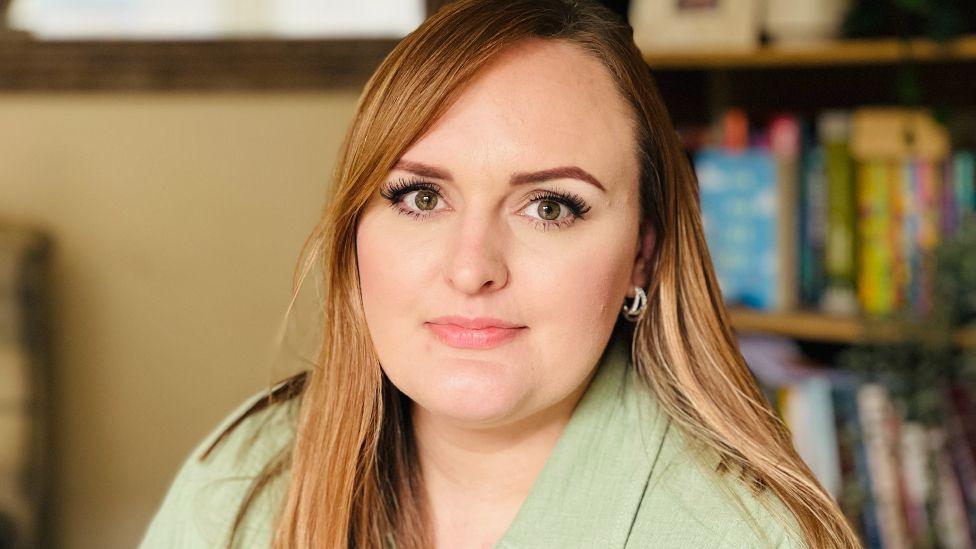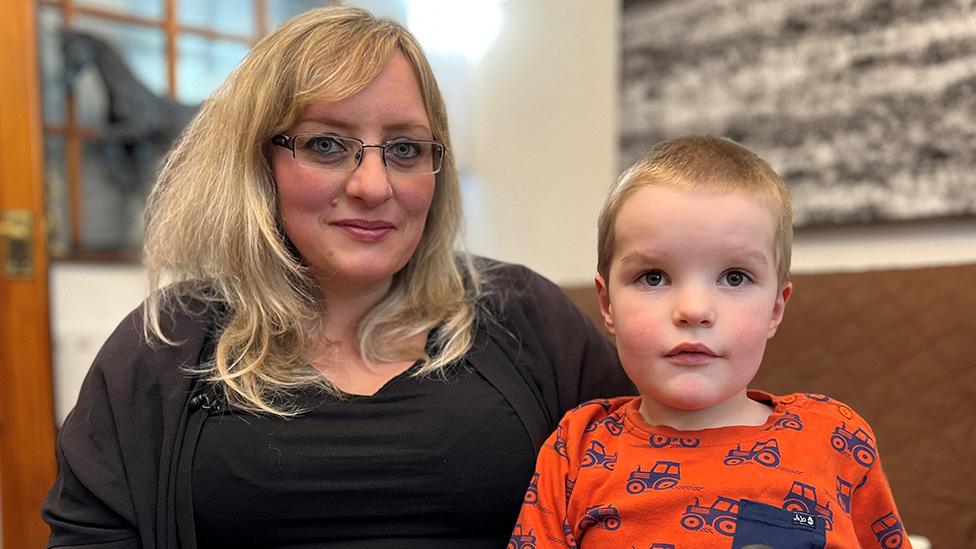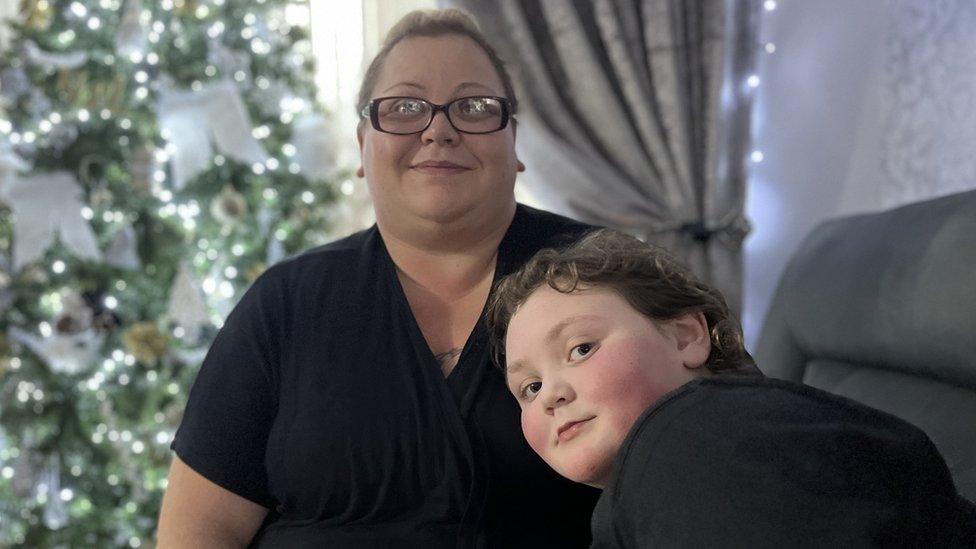Fears for children as special educational needs budgets tighten

Sarah Morgan is one of the parents caught up in seeking the right support for a child
- Published
Councils in England are forecasting a massive shortfall in budgets for supporting children with special educational needs.
The BBC has found councils face a deficit of almost £1bn in schools’ funds for these pupils.
Parent groups say they fear children could suffer in a push to cut deficits as demand rises at the same time as councils face growing pressure on their budgets.
Since 2019, the accumulated deficit in England for Special Educational Needs or Disabilities (Send) has reached £3.2bn, according to the County Council Network, with every sign of the gap between funding and spending increasing since last year.
The BBC contacted 153 councils in England to request their financial forecasts for this year, of which 113 responded.
Sarah Morgan is one of the parents caught up in seeking the right support for a child, having gone through a legal process last year.
Her daughter Isla, aged 11, is autistic and struggling to attend the special school where she has been given a place.
Sarah describes the process of getting Isla’s needs set out in an Education Health and Care Plan (EHCP) as “really hard and overwhelming”.
Like many parents, she resorted to going to a tribunal to get the plan updated.
Official statistics published this month show almost 600,000 children and young people now have an EHCP in England.
These EHCPs mean councils have a legal duty to meet the child or young person's needs.
Last year saw a 26% year-on-year increase, external in the number of new plans issued across England.
It’s part of a complex picture of growing demand, which councils are struggling to meet from the central government funding they receive for special educational needs and disabilities.

Sarah's daughter Isla, aged 11, is autistic
The BBC asked all the local authorities in England about the gap between funding and what they are actually spending out of their high needs budget.
The 100 that responded about the last financial year reported a deficit of £586m.
When asked about this year, 113 councils, not all the same ones, forecast a collective shortfall of £926m.
The financial pressures have become more visible and urgent, with 38 local authorities entering into bailout agreements with government.
In these “safety valve” deals, they receive some extra funding in return for an agreement to cut Send deficits.
This has set off alarm bells among parent groups who fear it may lead to limits being imposed on support.
The Independent Provider of Special Education Advice is a charity that helps families navigate the system.
They asked councils in the safety valve programme to provide details of what they would involve, receiving some information from 27.
Catriona Moore from the charity says some appear to be trying to reduce their legal obligations by reducing the number of EHCPs issued.
She said what they found was ”very little focus on children’s needs” and much more on “the financial bottom line”.
In our BBC investigation, the council with the biggest shortfall in proportion to its funding is not in the government’s bailout programme.
Cheshire East had a budget of around £56m for Send for the last financial year, and ended up spending £88m.
Under a special agreement in place with all councils in England until 2026, that deficit is added to what is called a “negative reserve”.
Cllr Sam Corcoran, the Labour leader of the council, describes this as hiding the problem, and says it’s part of a “broken system” that isn’t working for councils or families.
“It means that in 2026 we have a huge problem," he says. "It's a bit like we've put the money on a credit card, and that credit card has to be paid back in two years' time.”
In the meantime, he says the council will have to pay between £3m and £6m in interest on that borrowing.
Cllr Corcoran is also the deputy chair of a cross party network representing County Councils.
Their research suggests that if the deal to keep these deficits off the books isn’t renewed, or the extra money found by 2026, around a quarter of councils might need to ask for a government bailout.
The economists at the Institute for Fiscal Studies has said that, since 2015, meeting Send needs has absorbed around half the cash increase in school spending in England, around £3.5bn.

Almost 600,000 children and young people now have an EHCP in England
The National Association of Headteachers has called for any new government to write off the accumulated deficits in council budgets.
At Fishponds Church of England Primary in Bristol, headteacher Michelle Omoboni says she has seen a marked increase in children with additional needs.
Bristol is in a “safety valve” agreement and she is not sure how the council will manage to reduce spending.
For one child who the school thought needed one-to-one support, the top-up funding they received from the council was £81 a month, and the actual staffing cost was £140 a day.
In order to get funding in future, the school is having to make an application for an EHCP.
Mrs Omoboni says her fear is this will cause more issues for children.
“I don’t really understand where the money is going to come from unless children go without,” she says.
In every year up to 2029-30, the plan for Bristol says it will receive some extra cash, £4.6m this year, in return for putting in place steps to cut the Send deficit from a forecast £64m.
As with many similar plans, this is meant to provide more early intervention and support in mainstream schools.
There is some evidence that early intervention can make a difference, and that too takes money.
Addressing the legal rights of children, the fears of parents and the finances of councils will be one of the big challenges for the next education secretary.
None of the main parties mentioned the shortfall in Send budgets directly in their manifestos.
The Conservatives say they would deliver on a promise of 15 more special schools, while Labour promised to increase early intervention and support in mainstream schools.
The Lib Dems say they would establish a national body for Send to manage funding and give local authorities additional funding to meet the rising demand.
The Greens say they would push for £5bn of Send investment within mainstream schools.
Reform UK did not mention Send in their "contract".
Correction 18 June: A previous version of this story incorrectly stated the Lib Dems and Greens did not mention Send in their manifestos.
Additional reporting by Nathan Standley.
Get in touch
Have you been affected by the issues raised in this story?
Related topics
- Published17 May 2024

- Published14 December 2023

- Published5 March 2024
